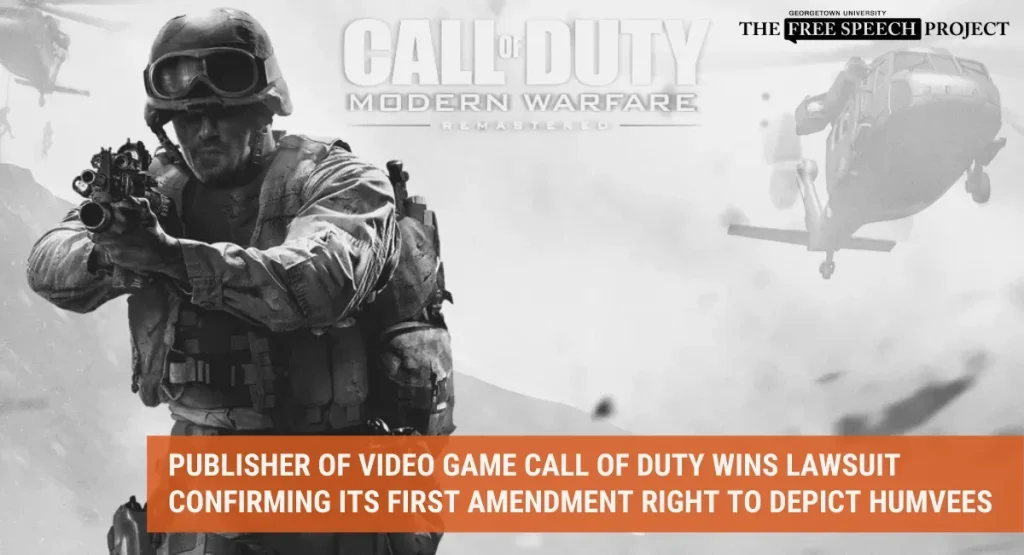The recent Call of Duty lawsuit has ignited a fierce debate surrounding video game liability and the responsibilities of game developers. This highly publicized case, launched by families of victims from the tragic Uvalde shooting in Texas, accuses Activision of being complicit in the gun violence that occurred during the attack due to its portrayal of firearms in the popular game franchise. Activision’s legal team has argued that the First Amendment protects their creative expressions, asserting that artistic works, including video games, cannot be held liable for the actions of individuals. As discussions about gun violence and video games become more pertinent, the case raises critical questions about the intersection of media, art, and responsibility. With its implications stretching far beyond this single lawsuit, the outcome could set a precedent in the ongoing discourse regarding the influence of violent video games on society.
The ongoing litigation over the Call of Duty video game raises significant issues about the accountability of game developers in the context of real-world violence. This case, linked to the heart-wrenching circumstances surrounding the Uvalde shooting, sees families asserting that Activision, the game’s creator, shares in the blame for their tragic losses. With the focus shifting to themes of First Amendment rights and artistic freedom, the argument posits whether a creative medium can impact individuals to the point of inspiring violent behavior. As court proceedings unfold, the legal community and the public alike watch closely to see how the judiciary navigates the complex relationship between gun violence, video gaming, and societal implications, possibly setting a vital precedent for future cases involving artistic expression.
Understanding the Call of Duty Lawsuit
The Call of Duty lawsuit has brought significant attention to the intersection of video games and real-world violence, especially in light of the tragic Uvalde shooting. Families of the victims are seeking accountability from Activision and Meta Platforms, the parent company of Instagram, alleging that the companies contributed to the circumstances of the attack through their products. The argument rests on the premise that the immersive experiences offered by these video games can influence players’ actions in real life. As the legal battle unfolds, key questions about artistic expression and liability surface, invoking the protection of the First Amendment.
During the proceedings, Activision’s attorney, Bethany Kristovich, contended that the contents of Call of Duty are protected under the First Amendment. She emphasized that courts have historically ruled in favor of creators, asserting that artistic works, including video games, are eligible for protection against lawsuits stemming from their audience’s actions. This case serves as a pivotal point in legal discussions about video game liability, especially in the context of horrific events like the Uvalde shooting.
First Amendment Rights and Video Game Liability
The ongoing Activision lawsuit highlights critical issues surrounding First Amendment rights as they pertain to creators of artistic content. Kristovich argued that the claims brought by the families must be dismissed because the First Amendment inherently shields the artistic expression found within video games. This line of reasoning stems from a long-standing legal precedent that protects creators from being held liable for the misuse of their works by individuals. As this case progresses, it sets the stage for an important discourse about how video games, firearms, and freedom of expression intersect.
On the other hand, the plaintiffs’ attorney, Josh Koskoff, presented arguments aimed at demonstrating the tangible impacts of video games, including Call of Duty, on real-life scenarios. By referencing the immersive experiences that players undergo, Koskoff posits that there is a level of connection that can lead to desensitization toward gun violence. This would suggest that video game companies have a responsibility to consider the societal implications of their products, particularly in a culture plagued by gun violence.
The Connection Between Gun Violence and Video Games
In recent years, the relationship between gun violence and video games has become a focal point of societal debate. Following the Uvalde shooting, discussions have intensified as families seek to hold companies like Activision accountable. The assertion that video games can affect behavior has fueled arguments about whether they contribute to violent tendencies, especially among young and impressionable audiences. Some studies lend credence to the theory that exposure to violent video games may desensitize individuals to violence, thereby escalating real-world ramifications.
However, advocates for the video game industry argue that video games are an artistic medium that should not be blamed for societal issues such as gun violence. Proponents of this view contend that many players engage with these games without any resulting adverse effects, emphasizing personal responsibility over corporate accountability. The prevailing question remains: can a video game company be held liable for the actions of a player in the real world?
Legal Precedents in Video Game Litigation
As cases like the Activision lawsuit emerge, it is essential to examine the legal precedents that shape the landscape of video game litigation. Historically, courts have ruled that creators are not liable for the actions of their audience, a principle deeply rooted in First Amendment protections. In essence, this understanding allows for a clear distinction between free expression and wrongful conduct attributed to individuals. Activision’s defense will likely hinge on these precedents as they argue against the lawsuit’s validity.
Moreover, the evolution of legal standards surrounding creative content indicates a greater recognition of artistic freedom, which includes the realm of video games. Recent cases reflect a trend toward allowing video game developers to operate without fear of litigation stemming from real-life tragedies, reinforcing the notion that blaming creators for the behavior of individuals may set a troubling legal precedent.
The Role of Corporate Accountability in Societal Violence
The notion of corporate accountability comes into sharp focus within the context of the lawsuit against Activision. As the families of Uvalde students pursue legal action, the underlying question pertains to whether corporations like Activision should bear some responsibility for the cultural narratives they help shape through their products. The argument posits that the way video games depict violence may influence individuals’ perceptions, particularly young users who may struggle to differentiate between fantasy and reality.
In these discussions, the role of major corporations in addressing social issues such as gun violence is scrutinized. With video games increasingly reflective of real-world conflicts, there are growing calls for developers to implement a sense of responsibility in their storytelling. This perspective suggests that while artistic expression is valuable, it should weigh the potential consequences, especially in a society grappling with the implications of gun violence.
Implications of the Uvalde Shooting on Media and Gaming Industry
The Uvalde shooting has prompted an intense spotlight on the media and gaming industry, igniting discussions about the cultural influences of violent video games. Following the devastating events, stakeholders in the industry are urged to consider the ramifications of their content on public perception and societal norms. Calls for greater responsibility in content creation may rise as families and advocates demand accountability for how violent actions are depicted in popular media.
In the wake of the tragedy, the gaming industry faces mounting pressure to reflect on its role in shaping attitudes toward violence. Furthermore, the lawsuits surrounding such incidents contribute to an ongoing dialogue about the effects of media consumption on behavior, particularly among youth. As these discussions continue, it is clear that the relationship between video games and societal issues will remain a contentious topic.
Industry Response to Gun Violence and Legal Challenges
In light of ongoing legal challenges such as the Call of Duty lawsuit, the gaming industry is encountering increasing scrutiny regarding its content and messages. Industry leaders are beginning to recognize the urgency of addressing societal concerns about gun violence. Some companies are proactively seeking to implement changes in game content, promote responsible messaging, and develop programs aimed at fostering positive behaviors among players.
Moreover, the legal climate surrounding issues like video game liability is pushing the industry to engage more in discussions about ethics and responsibility. As lawsuits gain traction, gaming companies may find it crucial to reassess their practices to align with the evolving expectations of consumers, advocacy groups, and lawmakers. The outcome of legal battles like the Activision case may very well shape the future of content creation in the gaming industry.
Cultural Narratives and the Evolution of Video Game Storytelling
Cultural narratives embedded within video games have a profound impact on how players engage with themes such as conflict and violence. As the gaming industry continues to push the envelope with realistic narratives, it raises concerns about their societal implications. The Uvalde shooting underscores the need for a deeper analysis of the messages conveyed through gaming, particularly those that revolve around gun use and aggressive behaviors.
Video games have the capacity to influence societal perceptions and encourage dialogue about critical themes. The current discourse surrounding the Call of Duty lawsuit invites players, creators, and communities to reflect on the narratives being portrayed within these games. As the industry evolves, it may pave the way for more responsible storytelling that takes into account the broader context of ongoing societal issues.
The Future of Gaming in the Shadow of Real-World Violence
The ongoing discourse surrounding the intersection of gaming and real-world violence raises pressing questions about the future of the gaming industry. The implications of lawsuits like the one against Activision signal a potential shift in how video game content may be approached by developers moving forward. It is essential for stakeholders to engage in proactive measures to ensure that artistic expression is balanced with public safety and accountability.
As society grapples with the ramifications of events such as the Uvalde shooting, the gaming industry has a unique opportunity to lead in promoting constructive dialogues about violence and representation. By addressing these issues head-on, the industry can foster an environment that prioritizes both creativity and social responsibility, ultimately shaping a more informed and conscientious gaming landscape.
Frequently Asked Questions
What is the Activision lawsuit related to Call of Duty about?
The Activision lawsuit related to Call of Duty involves families of victims from the Uvalde shooting suing the game’s maker, claiming responsibility for the products used by the shooter. They argue that video game content is linked to real-world violence, while Activision defends the case by invoking First Amendment protections.
How does the First Amendment apply to the Call of Duty lawsuit?
Activision argues that the First Amendment protects their artistic expression in video games, stating that they cannot be held liable for actions performed by players. This legal principle is central to the Call of Duty lawsuit, as courts have historically dismissed claims against creators of artistic works for audience behavior.
What is the families’ stance in the Call of Duty lawsuit?
Families of the Uvalde shooting victims assert that the immersive nature of Call of Duty influenced the shooter’s actions. They claim that the game’s realistic depictions of violence and connections to real firearms constitute a form of video game liability for the impact on vulnerable individuals.
What evidence did the plaintiffs present in the Call of Duty lawsuit?
In the Call of Duty lawsuit, families’ attorney Josh Koskoff presented contracts between Activision and gun manufacturers, claiming that the game’s depiction of firearms contributes to the blurring of reality and violence, thus holding Activision partly responsible for the shooter’s actions.
What is the significance of gun violence and video games in the Activision lawsuit?
The Activision lawsuit connects gun violence and video games by questioning the influence of violent video games like Call of Duty on real-life aggression. As courts weigh the artistic freedom of game developers against societal issues of gun violence, the outcome could set precedent for future claims.
How did Activision respond to the allegations in the lawsuit?
Activision’s lawyers, including Bethany Kristovich, have argued that the Call of Duty lawsuit lacks merit, emphasizing that the First Amendment protects their right to create video games. They maintain that the correlation between video games and real-world violence is not legally significant.
Is there a precedent for video game liability in lawsuits like the Call of Duty case?
Yes, there are precedents in which courts have ruled that video game creators cannot be held accountable for the actions of players. The Activision lawsuit will likely reference these cases as Activision seeks to reinforce the First Amendment protections against claims of video game liability.
What impact could the Call of Duty lawsuit have on the gaming industry?
The resolution of the Call of Duty lawsuit could impact the gaming industry significantly, especially regarding legal interpretations of First Amendment rights and video game liability. A ruling favoring Activision could reinforce protections for game developers against similar lawsuits in the future.
When was the Call of Duty lawsuit filed and what event does it commemorate?
The Call of Duty lawsuit was filed on the second anniversary of the Uvalde school shooting, which resulted in the tragic loss of 19 children and two teachers. This timing underscores the emotional weight and societal implications of the claims being presented.
What was the courtroom reaction during the Call of Duty lawsuit hearing?
During the hearing of the Call of Duty lawsuit, intense moments occurred when a clip from the game was played, leaving some audience members visibly affected by the sounds of gunfire, reflecting the deep connections between video game content and real-life tragedy.
| Key Point | Details |
|---|---|
| Call of Duty Lawsuit | Families of Uvalde victims sue Activision and Meta for responsibility in the shooting. |
| Legal Defense | Activision’s lawyer argues the lawsuit should be dismissed due to First Amendment protections. |
| First Amendment Argument | Activision claims that creators are not liable for actions of their audience, referencing prior court rulings. |
| Background of Shooting | The attack at Robb Elementary resulted in 19 students and 2 teachers being killed. |
| Family’s Claims | Families argue that the game inspired the shooter’s violent actions and presented a compelling case with evidence of immersion into the game. |
| Court Hearing | During the hearing, clips from the game were shown to illustrate the game’s impact. |
Summary
The Call of Duty lawsuit highlights the ongoing debate regarding the responsibility of video game creators in relation to real-world violence. Activision’s defense hinges on First Amendment protections, asserting that artistic expression cannot be held responsible for the actions of individuals influenced by that work. As the case progresses, the legal implications surrounding video game content and its impact on behavior continue to be scrutinized, posing significant questions for both the gaming industry and society at large.




